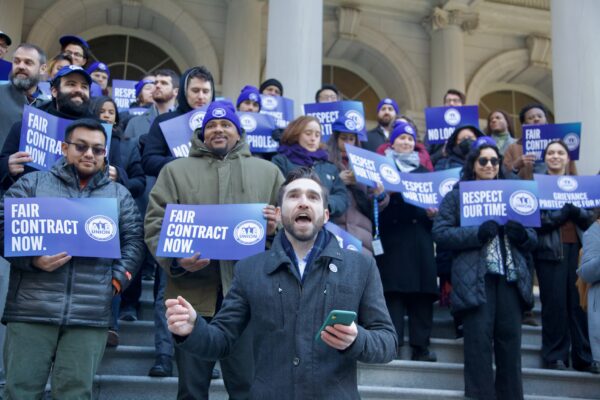May 29, 2014
By Joe Maniscalco
New York, NY – Union members working at the vanguard of mental health services say they no longer feel safe carrying out their duties because the state has put them at risk – and they want the governor to step in and do something about it before it’s too late.
“The staff has been attacked,” Sheila Conroy, CSEA Local 429 president, told LaborPress on Wednesday, May 28. “They have been groped. We are not feeling safe at all. Right now, our security is 911, and the Police Department.”
According to Conroy, who joined CSEA Metro Region President Lester Crocket and several staffers outside Cuomo's Manhattan offices this week, conditions at the Developmentally Disabled Services Office [DDSO] on Staten Island started to become increasingly dangerous for its largely female staff back in March when – without prior notification – the facility started seeing an influx of sex offenders for the first time due to the phasing out of the Brooklyn Developmental Center.
“We were not told that we were getting sex offenders,” Conroy said. “We’re trying to do the best that we can. We want to do the job, but we need male staffers.”
The planned closure of the Brooklyn Developmental Center, along with three other similar institutions in Queens County, Schenectady and Binghamton, is part of the Cuomo administration’s continued move away from the kind of longterm inpatient treatment previously provided at state hospitals.
But the CSEA – the union representing direct care workers at NYC’s five state psychiatric hospitals – charges that the state’s efforts at deinstitutionalization are actually hurting clients who desperately need help, while also ignoring the undue burdens being placed on hardpressed workers.
“The clients are suffering and the staff is overworked,” said Roslyn Akinware, a staffer at the Bronx Psychiatric Center for the last 27 years. “Our workload has doubled and it’s affecting the clients because they’re not getting the proper care.”
Where once mental health units consisting of up to 25 clients used to have 5 to 6 staffers assigned, Akinware said they might now only have to 3 staffers assigned during the day shift – and only two at night.
Critics of the state’s actions say that a number of contributing factors – including mandated overtime, an inordinate amount of workers placed on administrative leave, and unchecked attrition – are wearing out an already exhausted workforce.
“You’re not performing your job at the top of your abilities when you don’t have the proper sleep, you don’t have the proper nourishment and you don’t have the proper staff,” Conroy said.
Beyond that, staffers warn that too many seriously ill clients are being released into the wider community unprepared, unsupervised and unmedicated.
“These are mentally ill clients and they need help,” Akinware said. “Cuomo seems to think everything is fine and the clients are being taken care of – but it’s not happening.”
Presently, there are more mentally ill people housed at Rikers Island than in all of New York State’s psychiatric hospitals combined, according to Mental Illness Policy Org.
Fitzroy Wilson, a Brooklyn mental health care staffer with 25 years of experience, called the situation he and his co-workers are facing a “disaster.”
“It’s economically stupid to have so much overtime, when they could just hire more people,” Wilson said.
According to Conroy, the Staten Island DDSO could use as many as 30 male staffers.
Despite the state's efforts to forever close the book on the infamous Willobrook scandal, Crocket maintains that appropriate and needed services are still not being delivered, and is calling on Governor Cuomo to be more “sensitive” about all of the issues facing mental health care workers and their clients.
“The governor needs to take the time to sit down and talk to us to understand what the issues and problems are,” Crocket said. “We need government to be more involved in the process.”
The governor's office did not respond to requests for comment.



